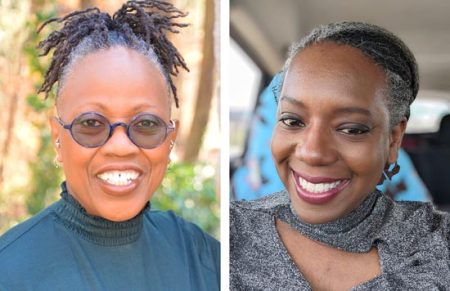Interview with Debra Jones
Debra Jones of Raleigh recently was awarded a contract by the City of Asheville to undertake leadership of the city’s reparations work.

Debra Jones of Raleigh recently was awarded a contract by the City of Asheville to undertake leadership of the city’s reparations work.
Jones has been the vice president for advancement, external affairs, and technology at the Raleigh HBCU, St. Augustine’s University, as well as the leader of the consulting group TEQuity, which previously undertook a business disparity study that led Asheville to change from a “race-neutral” policy to a “race-conscious” one in hiring private contractors for city business.
Reparations Commission Makeup
The city in 2020 passed a resolution to undertake reparations to the Black community for its historic discrimination, in particular redlining of poor, primarily African American neighborhoods, and generations of official exclusion from city contracts and business, professional, and other opportunities for achievement. Jones will lead the project to implement the resolution’s goals through taking measurable and verifiable steps to repair the harm that has been done to African Americans.
Brenda Mills, the city’s Equity and Inclusion Director, describes the work as “outreach to historically impacted Black communities and the development of a process to appoint a Reparations Commission,” which will consist of 25 members who will focus on providing recommendations to the Asheville City Council on how to turn the promise of reparations into reality. Asheville City Council and the Buncombe County Commission will name six members each based on the impact areas of criminal justice, housing, healthcare, education, and economic development, and historically Black communities will nominate the other 13.
Jones explained, “Thirteen members will be selected to represent city neighborhoods historically impacted by discrimination and redlining—Southside, East End/Valley Street, Shiloh, Burton Street, Heart of Chestnut Hills, Stumptown, and public housing communities—and to focus on those specific impact areas.”
Process and Timeline
Jones told The Urban News that, having put out a proposal for neighborhood nominations as well as applications for the Council and Commission appointments, she and Mills will review feedback and draft nomination forms. They hope to launch the public solicitation for nominations for commission appointments on Nov. 15. The plan then is to finish the nomination window just before Christmas so as to give the neighborhood groups and elected officials time to review the applications, and then have all appointments made by February. City Council and County Commission will make their own decisions as to whom to appoint; similarly, each of the neighborhood groups will choose its own representatives.
Once the Community Reparations Commission is fully in place, Jones’s job will be “to ensure that Commission members are fully empowered.
“We will be providing the initial framework for completing the work that was outlined in the resolution, including expectations and activities. For example, the Commission will document the actual harm by doing research around reparations; learn more about what reparations consists of (as well as what’s happening elsewhere around the nation), and assist with the Commission’s immersion with that whole space.
“Then,” she continued,” they’ll take deeper dives into the focus areas—documenting the harm done to Black Asheville in those areas.”
Setting and Reaching Goals
Mills and Jones anticipate engaging additional community partners, such as UNC Asheville students who have expressed a strong interest in assisting with the Commission’s work. They will also solicit as many community stakeholders as they can to support the work of the Commission: churches, the medical community, educators, entrepreneurs, historians and other academics, and others.
Jones explained that there will be three stages of developing recommendations for the short, middle, and long terms, though those will be discussed and defined by the Commission. To provide a framework, Jones has secured five local facilitators/liaisons and will continue to seek out individuals with expertise in the specific impact areas to work with the Commission, bring in speakers, and work on development of those recommendations.
While Jones and Mills want to “keep us moving along at a good pace,” they also will follow City Manager Debra Campbell’s instruction not to sacrifice quality for artificial deadlines.
The City team led by Jones plans to immerse the community into the process as well, including by inviting the public to attend sessions with public speakers and experts.
Engaging the Public and Stakeholder Groups
“The community at large needs to understand what ‘reparations’ means, what has been the harm done, and so forth,” Jones explains. “This is not limited to ‘Black Asheville.’ Everyone needs to understand why the city and county decided to pursue this. When we bring in scholars, we anticipate setting up so that community can take part from a listening standpoint.”
In addition to reaching out to the public to explain the steps being taken and benchmarks reached by the Commission, Jones anticipates that there will be some blowback and concerns, especially from more conservative residents.
“We welcome those voices from throughout the community. Our position is that we want to work together with all segments of the community. Many of us are after the same aims. Of course, we hope that public input will be solutions oriented and constructive, and we have contemplated public input very early on.”
Mills notes, “We’ve heard that we needed to ‘move quicker.’ ‘Move forward.’ ‘Start receiving applications now.’ Others are saying ‘there’s too much going on behind the scenes, we want an opportunity to have our input.’ What we have to do is hit the pause button, make sure to do the right thing, not just rush to get something out. So it’s important to hear all voices, even if it’s a complaint.”
Offering an overview, Jones said, “Those who got us where we are today, who were instrumental in getting the resolution passed, should assume there will be a lot of benefit and progress we can make together. That’s one reason we want to introduce a third area: soliciting individuals or community-based organizations and businesses that want to support the work. To do that we need to reach out to them, then receive information from them about how they want to support this work, and how they can participate, or at least help. While it will ultimately be up to the Community Reparations Commission how to incorporate community participation, ultimately it has to be a collective where we’re all working together.”
Facing Opposition
We asked Jones about controversies they might be anticipating with the growth of the white supremacy movement, as well as simple embedded racism in the larger community.
“Absolutely,” she said. “That’s another reason it’s important to educate the entire community. We want to help set the record straight. What is reparations? It’s redressing actual harm done. Based on some of the comments to date, we know it’s important to open up that education to the entire community. The city and county have already spoken about their position—but we need to keep in mind that the first step in any reparations program is to acknowledge the harm. Only then can you take the next step: to redress the harm. The Commission’s position is to move forward with the next step.”
“We really want to look at formalizing our affiliations. We’d love to have panel discussions with Black businesses about challenges bought by systemic racism. Talk about the challenge of starting, and of sustaining a business. Support and engagement from groups like the Black Wall Street AVL business hub that J. Hackett of Grind AVL is starting in the River Arts District could help to inform the public of historic documentation of the harm done, and then help with implementation of the Commission’s final recommendations for repairing that harm.
“And of course we’ll stay involved with organizations by institutionalizing the knowledge gained, through churches, museums, etc. Once redress is made, there can only be closure if the harm doesn’t continue—if there’s institutional knowledge to ensure that this can never happen again.”
Besides acknowledgement and support of the goals of the Commission, Jones is looking at tangible ways both for-profit and nonprofit groups can further its work.
“In formalizing affiliations,” she says, “we’re also looking at ways in which any stakeholder can assist. What type of support do our Commission members need? Do they need technology?”
For example, a business might choose to donate technology—computers, tablets, or even a high-speed broadband connection—for members who don’t have access to a laptop or Zoom. Another business might offer child-care so parents can more easily participate. Or a church or synagogue might help arrange transportation to attend Commission-sponsored events.
“But in addition to this type of gifts in kind, endorsing the effort is important,” adds Jones. “For a business to publicly [and emphatically] say, ‘We support reparations’ goes a long way to cement community support.”
When at last the Community Reparations Commission gets off the ground, gets organized, and gets its recommendations formalized and placed before elected officials, its supporters can only hope that Asheville City Council and Buncombe County Commission will follow through.







